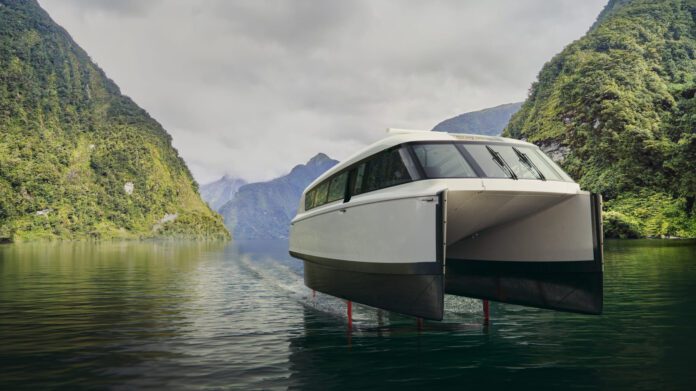Swedish electric boat maker Candela is in the process of deploying its Candela P-12 hydrofoil ferry in both Sweden and New Zealand. The P-12, like other hydrofoils in the Candela range, “flies above the water on computer-guided hydrofoils”. It has limited drag in the water, leaving minimal wake behind the boat, which affords an 80 percent reduction in energy usage compared with other electric vessels – and therefore a longer range and higher speed.
Its IoT componentry is not clear (albeit requested by RCR); but Candela claims to have “had to develop nearly all [its] technology in-house”. The firm says: “The P-12 is stabilised in real-time by a computer system – a flight controller which prevents… pitching and slamming. The controller uses sensors to measure the wave height in front of the vessel, and then adjusts the hydrofoils’ angle of attack 100 times per second to provide a smooth ride over them.”
As such, Candela says its hydrofoils eliminate motion sickness. It has issued a press statement that New Zealand electric utility Meridian Energy is to deploy the P-12 to ferry workers across Lake Manapōuri in New Zealand, starting next year (2025). The P-12 has been deployed already as a pilot in Stockholm, to join the city’s fleet of public transportation ferries to shuttle passengers around the local open-water archipelago of 30,000 islands and skerries.
Local mobile operator Tele2 is likely involved in the supply of IoT connectivity for the Stockholm pilot – on the grounds it was involved with Candela’s C-8 leisure boat, which launched in 2019. It wrote in a blog, dating back to the C-8 period: “When it comes to IoT, Candela is a prime example of an IoT-enabled product that uses IoT to serve customers globally. Data on everything from motor performance to the location of the boat is logged.”
It continued: “If there is an anomaly in the electric systems, for example, Candela can track that and also fix it remotely.” Connectivity saves a lot of time and money for Candela and [its] customers. They don’t need service centres all over the world because most problems can be fixed remotely through connectivity and IoT.” The post quoted Candela, itself; the company remarked: “IoT allows us to troubleshoot and also fix problems remotely.”
Candela claims the P-12 has the “highest top speed and longest range of any electric ferry”. In PR terms, the deal with Meridian Energy in New Zealand is certainly a good photo opp. Lake Manapōuri is a UNESCO World Heritage Area, and “the country’s most beautiful lake”. The hydrofoil design provides environmental benefits, as well. “The wake behind the vessel is less than 15cm high, which will minimise disruption to the shoreline of Lake Manapōuri.
The area is home to indigenous species, including the longfin eel. The P-12 has a top speed of 30 knots, and a range of 50 nautical miles (at 25 knots). Its design makes it the “most efficient fast ship to date”, says Candela. “Minimal wake generation can cut travel times drastically, given exemptions from speed limits – as in Stockholm,” it adds. It also claims 90 percent lower costs (“energy/maintenance”) than diesel vessels, and low investments in charging infrastructure.
“A typical DC charger for cars is sufficient,” it says. The Stockholm trial, running throughout 2024, will evaluate all of this – performance in terms of manoeuvrability, comfort, chargeability, wake, and noise. Candela reckons the Stockholm ferry crossings will show operational costs can be reduced by at least 40 percent. In New Zealand, where the P-12 will ferry staff and contractors servicing the country’s largest hydro power station, the Manapōuri Power Station, it will save 240 tons of carbon emissions each year, it reckons – “equivalent to taking 52 petrol cars off the road”.
Tania Palmer, general manager of generation at Meridian Energy, said: “We have to be bold and innovative to reduce emissions. This deal is the result of a global search to identify the latest and best technology for our needs, and one that’s suitable for such an incredible natural environment. The Candela P-12 is an exciting replacement for the diesel ferry we currently use to transport people across the lake to the power station. It’ll drastically reduce emissions and, at the same time, give our team what’s arguably the best and most spectacular commute in the world.”
Gustav Hasselskog, chief executive at Candela, said: “We’re excited to partner with a global leader in the transition to sustainable energy and global decarbonisation and thrilled to soon see our P-12 in action on Lake Manapōuri. We thank Meridian for leading the charge towards a cleaner, greener future.”

